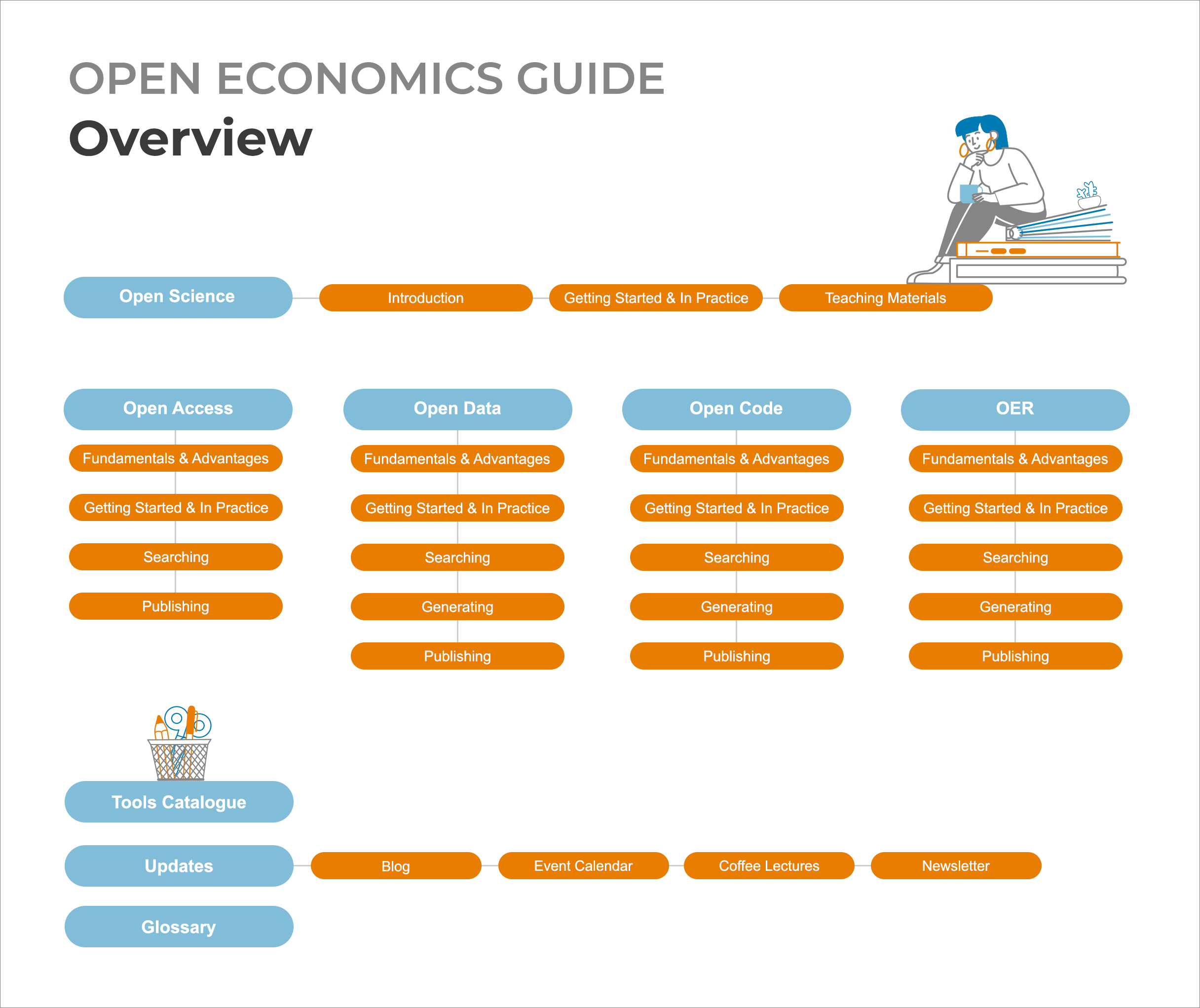How good scientific practice functions with Open Science
 The Open Economics Guide is the central point of reference for researchers from the field of economics and business studies on the topic of Open Science. Practicing open research means basing one’s research on best practice procedures for scientific work and following good scientific practice. It enables higher quality, greater reliability and credibility, fairness and an increase of efficiency for scientific work. It can create new impetus for research and knowledge exchange, both within science as well as for the economy and society. The individual advantages that Open Science provides include greater visibility of scientific work as well as a greater impact in research and society.
The Open Economics Guide is the central point of reference for researchers from the field of economics and business studies on the topic of Open Science. Practicing open research means basing one’s research on best practice procedures for scientific work and following good scientific practice. It enables higher quality, greater reliability and credibility, fairness and an increase of efficiency for scientific work. It can create new impetus for research and knowledge exchange, both within science as well as for the economy and society. The individual advantages that Open Science provides include greater visibility of scientific work as well as a greater impact in research and society.
Open Science thereby leads to a number of improvements for individual researchers, the entire science system and society at large. In this guide, you can discover how openness can also enrich your research as an economic scientist. You will receive here an overview of the tools that make your work easier and receive support as well as useful tips to design your research so that it is open and to profit from the advantages.
Practice-based background articles, a helpful tool library and more
The Open Economics Guide provides you with an overview of Open Science, quick orientation and guides including:
- background articles with practical tips to Open Science topics (Open Science, Open Access, Open Data, Open Code, Open Tools and Open Educational Resources).
- a comprehensive tool library that focuses on the phases of the scientific workflow.
- a clearly written glossary that can answer your questions on the meaning of the most important terms relating to open research.
The ZBW supports research economists and makes Open Science easier
The ZBW – Leibniz Information Centre for Economics is the world’s largest research infrastructure for economics literature and has a cross-regional mandate. It supports economics and business studies researchers and students online and offline in their learning, research and publication process, in which the services are based on the newest findings from application-based research in IT and related disciplines.
The ZBW is very engaged in the field of Open Science. Its aim is to strengthen the commercial independence and excellence of science, and enable easy, fast access to scientific results, publications and data. For this purpose, the ZBW is developing, among other things, new programmes that correspond to the Open Science ideal or to achieving it, by making access easier and breaking down barriers. These services include:
- EconStor for publishing working papers.
- EconBiz for searching Open Access literature.
- Journal of Comments and Replications in Economics (JCRE) publishes replications and comments on previously published papers.
- ZBW Journal Data Archive for searching linked records of some journal publications.
- Open Library Economics supports editors who want to operate their economics journals in Open Access independently of commercial publishers.
- Expedition Open Science Land for an illustrative introduction to Open Science in business administration.
At the same time the ZBW is engaged in scientific policy at the national and international level, working towards the implementation of Open Science and carrying out research into this field. If you would like to know more about this, then take a look at the Open Science Magazine of the ZBW, in which new perspectives, articles, podcasts and useful worksheets are waiting for you each month.
Coffee Lectures on Open Science Education
In addition, the ZBW offers the free "Coffee Lectures on Open Science Education": This is a series of online presentations that show very specific examples of how the principles, methods and tools of Open Science can be integrated into higher education. The Coffee Lectures are specifically tailored to economics and related disciplines. Further information can be found on the event page.
Focus and thematic layout of the guide
The Open Economics Guide is constantly being expanded and focuses primarily on the topics of Open Science in general, Open Access, Open Data, Open Code and Open Educational Resources. Some of the guide's content focuses on German-speaking or German-speaking countries, for example when it comes to funding conditions. Nevertheless, most of the content is also of international interest.
If you have any questions on Open Science, suggestions for our guide or tips for further (international) content, we would be delighted to receive a message from you!
